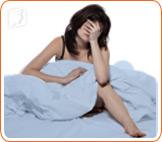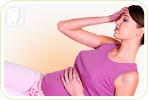
It's 3 a.m. and you've awoken drenched in sweat,your heart is racing, you're disoriented and confused. You're suffering a night sweat, and the worst part, is that once it's over it can be even more challenging to get back to sleep. If you're going through menopause, it can often seem as though nothing will be able to help you cope with your night sweats. However, there are ways you can alleviate one of the most common symptoms of menopause and gain more sleep.
Exercise
It's no secret that exercise makes you healthier. Did you know that exercising regularly can also help fall asleep and stay asleep? Exerting energy throughout the day will make it that much easier to prevent insomnia. As an added bonus exercise boosts hormone production, which can replenish the level of hormones a woman loses during menopause and relieve some of the common menopausal symptoms, including night sweats and insomnia.
Avoid Caffeine

Avoid caffeine to prevent insomnia.If you're a coffee addict, it may be best to cut back. The caffeine excites the body and can make it harder to fall asleep. If you absolutely need a jolt to get through the day, try to keep your intake below three cups a day. You'll thank yourself when you're able to sleep soundly.
Alternative Medicine
The effects of alternative medicines are still being researched, but, several women say they help relieve some of their menopause symptoms. Estrogenic herbs like black cohosh and ginseng replace estrogen in your body with phytoestrogens and improve the hormonal balance.Hormone-regulating supplements are thought to boost the body's natural hormone production without the side effects of their estrogenic counterparts.
Talk to a Doctor
If you are concerned about night sweats, consult your doctor, as this unpleasant symptom can be caused by a number of treatable medical conditions such as hyperthyroidism, influenza, hypoglycemia, and other medical conditions.If night sweats and insomnia are an ongoing problem despite your best efforts, talk to a doctor about your options. It is best to turn to drugs and surgery after all other methods have been exhausted.
Sources
- Boston Women's Health Collective. "Hot Flashes, Night Sweats and Sleep Disturbances". Our Bodies, Ourselves, 2006.
- The National Institute of Health.(n.d): "Signs of the Menopausal Transition".Retrieved from www.nih.gov
- Von Muhlen, DG, et al. "A community-based study of menopause symptoms and estrogen replacement in older women". Maturitas. Sept 1995; 22(2):71-8.


